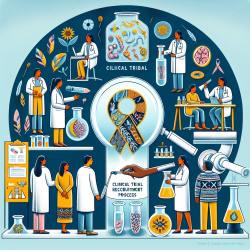Understanding the Importance of Trust in Clinical Trial Recruitment
As practitioners in the field of speech-language pathology, it's crucial to understand the importance of trust and cultural sensitivity in clinical trial recruitment, especially when working with culturally distinct communities such as the Haudenosaunee. The research article "Views on clinical trial recruitment, biospecimen collection, and cancer research: population science from landscapes of the Haudenosaunee (People of the Longhouse)" provides valuable insights into improving recruitment strategies through respectful partnerships and culturally appropriate materials.
Key Findings from the Research
The study highlights several barriers to participation in clinical trials among Native American communities, including historical mistrust and lack of culturally relevant materials. The Haudenosaunee, like many Native American groups, have endured significant health disparities, which can be partially attributed to genetic predispositions and socio-economic factors. The research emphasizes the need for:
- Building Trust: Establishing respectful partnerships with the community and being transparent about the research process.
- Culturally Appropriate Materials: Using recruitment materials that resonate with the community's cultural identity, including language and imagery.
- Understanding the Consent Process: Ensuring participants fully understand what they are consenting to, with clear explanations of medical terminology.
- Providing Summary Sheets: Offering concise summary sheets that outline the key points of the study.
Implementing Research Outcomes in Practice
For practitioners looking to improve their recruitment strategies, the following steps are recommended:
- Engage with the Community: Build long-term relationships with community leaders and members. This can involve attending community events and seeking input on research agendas.
- Develop Culturally Relevant Materials: Collaborate with community members to create materials that reflect their cultural values and languages.
- Enhance the Consent Process: Simplify the consent process by using layman's terms and ensuring participants understand the implications of their participation.
- Provide Clear Communication: Regularly update the community on research progress and outcomes to maintain transparency and trust.
Encouraging Further Research
The study also encourages further research into culturally sensitive recruitment strategies and the development of tools that facilitate better communication between researchers and minority communities. By adopting these practices, practitioners can contribute to reducing health disparities and improving outcomes for underrepresented populations.
To read the original research paper, please follow this link: Views on clinical trial recruitment, biospecimen collection, and cancer research: population science from landscapes of the Haudenosaunee (People of the Longhouse).










